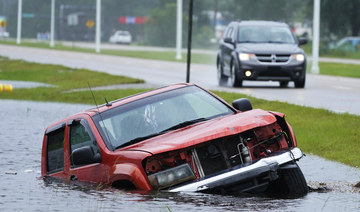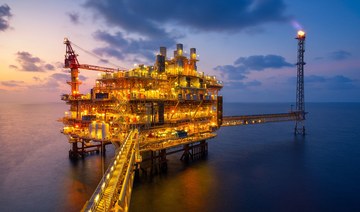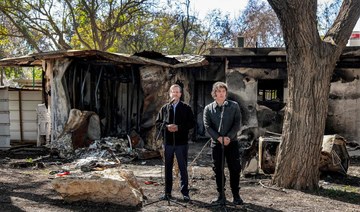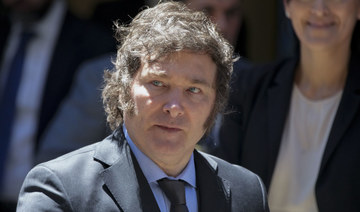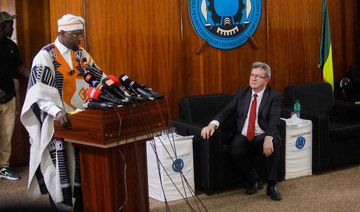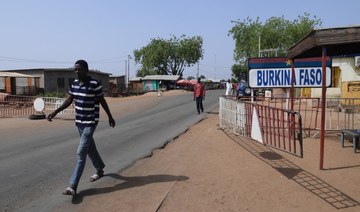NEW ORLEANS: Rescuers in boats, helicopters and high-water trucks brought people trapped by Hurricane Ida’s floodwaters to safety Monday and utility repair crews rushed in, after the furious storm swamped the Louisiana coast and ravaged the electrical grid in the stifling, late-summer heat.
Residents living amid the maze of rivers and bayous along the state’s Gulf Coast retreated desperately to their attics or roofs and posted their addresses on social media with instructions for search-and-rescue teams on where to find them.
More than 1 million homes and businesses in Louisiana and Mississippi — including all of New Orleans — were left without power as Ida, one of the most powerful hurricanes ever to hit the US mainland, pushed through on Sunday.
The damage was so extensive that officials warned it could be weeks before the power grid was repaired.
As the storm was downgraded to a tropical depression Monday afternoon and continued to make its way inland with torrential rain, it was blamed for at least two deaths — a motorist who drowned in New Orleans and a person hit by a falling tree outside Baton Rouge.
But with many roads impassable and cellphone service out in places, the full extent of its fury was still coming into focus. Christina Stephens, a spokesperson for Gov. John Bel Edwards, said that given the level of destruction, “We’re going to have many more confirmed fatalities.”
The governor’s office said damage to the power grid appeared “catastrophic” — dispiriting news for those without refrigeration or air conditioning during the dog days of summer, with highs forecast in the mid-80s to near 90 by midweek.
“There are certainly more questions than answers. I can’t tell you when the power is going to be restored. I can’t tell you when all the debris is going to be cleaned up and repairs made,” Edwards told a news conference. “But what I can tell you is we are going to work hard every day to deliver as much assistance as we can.”
In hard-hit LaPlace, squeezed between the Mississippi River and Lake Pontchartrain, rescuers saved people from flooded homes in a near-constant operation.
Debbie Greco, her husband and son rode out the storm in LaPlace with Greco’s parents. Water reached the first-floor windows, then knocked down the back door and filled the brick home with 4 feet of water. They retreated to the second floor, but then screaming winds collapsed the roof.
They were finally rescued by boat after waiting in the only dry spot, five people sharing the landing on the stairs.
“When I rebuild this I’m out of here. I’m done with Louisiana,” said Greco’s father, 85-year-old Fred Carmouche, a lifelong resident.
Elsewhere in LaPlace, people pulled pieces of chimneys, gutters and other parts of their homes to the curb and residents of a mobile home park waded through floodwaters.
In just three parishes, 191 people and 27 pets had been rescued by Monday afternoon, Edwards said.
The hurricane blew ashore on the 16th anniversary of Katrina, the 2005 storm that breached New Orleans’ levees, devastated the city and was blamed for 1,800 deaths.
This time, New Orleans appeared to escape the catastrophic flooding city officials had feared.
Stephanie Blaise returned to her home with her father in New Orleans’ Lower Ninth Ward after evacuating. The neighborhood suffered devastating flooding in Katrina, but only lost some shingles in Idaho However, with no idea when electricity would be restored, Blaise didn’t plan to stay long.
“We don’t need to go through that. I’m going to have to convince him to leave. We got to go somewhere. Can’t stay in this heat,” she said.
The city urged people who evacuated to stay away for at least a couple of days because of the lack of power and fuel. “There’s not a lot of reasons to come back,” said Collin Arnold, chief of emergency preparedness.
Also, 18 water systems serving about 255,000 customers in Louisiana were knocked out of service, the state Health Department said.
Four Louisiana hospitals were damaged and 39 medical facilities were operating on generator power, the Federal Emergency Management Agency said. Officials said they were evacuating scores of patients to other cities.
The governor’s office said over 2,200 evacuees were staying in 41 shelters, a number expected to rise as people were rescued or escaped flooded homes. The governor’s spokesperson said the state will work to move people to hotels as soon as possible so they can keep their distance from one another.
“This is a COVID nightmare,” Stephens said, adding: “We do anticipate that we could see some COVID spikes related to this.”
Preliminary measurements showed Slidell, Louisiana, got at least 15.7 inches of rain, while New Orleans received nearly 14 inches, forecasters said. Other parts of Louisiana and Mississippi, Alabama and Florida got 5 to 11 inches.
The Louisiana National Guard said it activated 4,900 Guard personnel and lined up 195 high-water vehicles, 73 rescue boats and 34 helicopters. Local and state agencies were adding hundreds more. Edwards said he decided not to tour hurricane damage by air Monday to add one more aircraft to the effort.
On Grand Isle, the 40 people who stayed on the barrier island through the brunt of the hurricane gave aircraft checking on them Monday a thumbs-up, Jefferson Parish Sheriff Joe Lopinto said.
The road to the island remained impassable and rescuers would try to reach them as soon as they are able, the sheriff said.
The hurricane twisted and collapsed a giant tower that carries key transmission lines over the Mississippi River to the New Orleans area, causing widespread outages, Entergy and local authorities said. The power company said more than 2,000 miles of transmission lines were out of service, along with 216 substations. The tower had survived Katrina.
The storm also flattened utility poles, toppled trees onto power lines and caused transformers to explode.
The governor said 25,000 utility workers were in the state to help restore electricity, with more on the way. “We’re going to push Entergy to restore power just as soon as they can,” Edwards said.
AT&T said its wireless network in Louisiana was reduced to 60 percent of normal but was coming back. Many people resorted to using walkie-talkies. The governor’s office staff had no working phones. The company sent a mobile tower to the state’s emergency preparedness office so it could get some service.
Charchar Chaffold left her home near LaPlace for Alabama after a tree fell on it Sunday. She frantically tried to get in touch via text message with five family members who stayed behind.
She last heard from them Sunday night. They were in the attic after water rushed into their home. “They told me they thought they was going to die. I told them they are not and called for help,” she said.
Ida’s 150 mph (230 kph) winds tied it for the fifth-strongest hurricane ever to hit the mainland. Its winds were down to 40 mph (64 kph) around midday Monday.
In Mississippi’s southwestern corner, entire neighborhoods were surrounded by floodwaters, and many roads were impassable. Several tornadoes were reported, including a suspected twister in Saraland, Alabama, that ripped part of the roof off a motel and flipped an 18-wheeler, injuring the driver, according to the National Weather Service.
Ida was expected to pick up speed Monday night before dumping rain on the Tennessee and Ohio River valleys Tuesday, the Appalachian mountain region Wednesday and the nation’s capital on Thursday.
Forecasters said flash flooding and mudslides were possible along Ida’s path before it blows out to sea over New England on Friday.
___
Reeves reported from LaPlace, Louisiana. Associated Press writers Janet McConnaughey and Kevin McGill in New Orleans; Melinda Deslatte in Baton Rouge; Michael Biesecker in Washington; Sudhin Thanawala in Atlanta; and Jeffrey Collins in Columbia, South Carolina, contributed to this report.
Hurricane Ida traps Louisianans, shatters the power grid
https://arab.news/gny7u
Hurricane Ida traps Louisianans, shatters the power grid
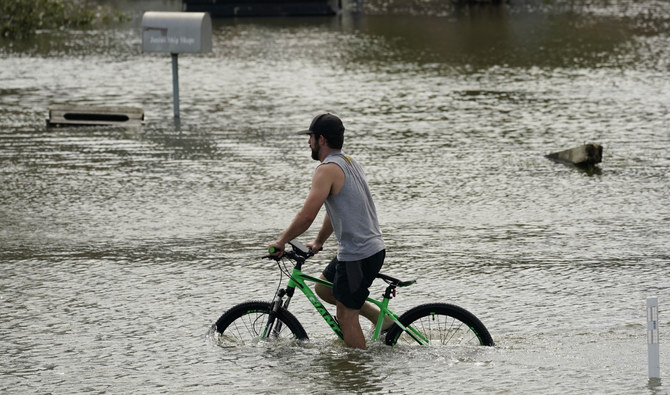
Argentine president begins unusual visit to Spain, snubbing officials and courting the far-right

- The brash President Javier Milei has no plans to meet Spain's PM — nor any other government official
- He will instead attend a far-right summit Sunday hosted by Sánchez’s fiercest political opponent, the Vox party
BUENOS AIRES, Argentina: Even before kicking off a three-day visit to Madrid on Friday, Argentina’s libertarian President Javier Milei stirred controversy, accusing the socialist government of bringing “poverty and death” to Spain and weighing in on corruption allegations against the prime minister’s wife.
In such circumstances, a typical visiting head of state may strive to mend fences with diplomacy.
Not Milei. The brash economist has no plans to meet Spanish Prime Minister Pedro Sánchez during his three days in the Spanish capital — nor the Spanish king, nor any other government official. Instead, he’ll attend a far-right summit Sunday hosted by Sánchez’s fiercest political opponent, the Vox party.
The unorthodox visit was business as usual for Milei, a darling of the global far right who has bonded with tech billionaire Elon Musk and praised former US President Donald Trump. Earlier this year on a trip to the United States, Milei steered clear of the White House and took the stage at the Conservative Political Action Conference, or CPAC, where he railed against abortion and socialism and shared a bear hug with Trump.
Milei presented his 2022 book, “The Way of the Libertarian,” in Madrid Friday at a literary event organized by La Razón, a conservative Spanish newspaper.
The book — withdrawn from circulation in Spain earlier this month because the back-flap biography erroneously said Milei had earned a doctorate — traces his meteoric rise in politics from eccentric TV personality to national lawmaker and outlines his radical free-market economic ideas.
To thunderous applause, Milei condemned socialism as “an intellectual fraud and a horror in human terms.”
“The good thing is that the spotlight is shining on us everywhere and we are making the reds (leftists) uncomfortable all over the world,” Milei said.
He took the opportunity to promote the results of his harsh austerity campaign in Argentina, celebrating a decline in monthly inflation in April though making no mention of the Buenos Aires subway fares that more than tripled overnight.
Repeating a campaign pledge to eliminate Argentina’s central bank — without giving further details — Milei promised to make Argentina “the country with the most economic freedom in the world.”
At the event Milei gave a huge hug to his ideological ally Santiago Abascal, the leader of the hard-right Vox party and the only politician with whom Milei has actual plans to meet in Madrid.
The Vox summit Sunday seeks to bring together far-right figures from across Europe in a bid to rally the party’s base ahead of European parliamentary elections in June. Milei described his attendance a “moral imperative.” He also has plans to meet Spanish business executives Saturday.
Tensions between Milei and Sánchez have simmered since the moment the Spanish prime minister declined to congratulate the libertarian economist on his shock election victory last November.
But hostility exploded earlier this month when one of Sánchez’s ministers suggested Milei had taken narcotics. The Argentine presidency responded with an unusually harsh official statement accusing Sánchez’s government of “endangering the middle class with its socialist policies that bring nothing but poverty and death.”
The lengthy government statement also accused Sánchez of having “more important problems to deal with, such as the corruption accusations against his wife.”
The allegations of influence peddling and corruption brought by a right-wing group against Sánchez’s wife, Begoña Gómez, had prompted Sánchez, one of Europe’s longest serving Socialist leaders, to consider stepping down.
Senegal’s new president welcomes challenge to help reconcile ECOWAS with Mali, Burkina Faso, and Niger

- Ghana’s President Akufo-Addo sought Bassirou Diomaye Faye's help during their meeting in Accra on Friday
- Faye said that he hoped to convince the countries to “come back and share our common democratic values and what we stand for”
ACCRA: Ghana’s president Friday urged his visiting Senegalese counterpart to use his goodwill within the Economic Community of West African States to help resolve disputes with Niger, Burkina Faso and Mali.
President Bassirou Diomaye Faye arrived in the capital Accra early in the morning after visiting Nigeria’s President Bola Ahmed Tinubu.
Niger, Mali and Burkina Faso in January 2024 announced they were leaving ECOWAS after they were suspended by the group over military coups in all three nations.
“We are lucky to have a new leader in place because I think he is also going to help us to try and resolve the big problem that we have in the ECOWAS community,” Ghana’s President Nana Akufo-Addo said after meeting Faye.
“President Faye is very committed to seeing what he and the rest of us can do to reach out and revive the dialogue.”
Speaking to reporters after bilateral talks, Akufo-Addo said Faye had demonstrated commitment to ECOWAS efforts to bring the three countries to the table for further talks and back to the bloc.
Faye, 44, won a resounding victory as an anti-establishment candidate promising major reforms to become Senegal’s youngest-ever president.
His election has been seen as an inspiration for change in contrast to some of the continent’s aging leaders who have been in power for years and to other countries now run by military governments.
He welcomed the challenge to help reconcile ECOWAS with Mali, Burkina Faso, and Niger.
ECOWAS “is going through difficult times but we are going to do all we can to consolidate the gains made in integration, in a spirit of common, fraternal solidarity,” Faye told reporters.
Unity was “primordial” in the region, he added.
Earlier in Nigeria, Faye said that alongside Nigeria, which currently chairs ECOWAS, he hoped to convince the countries to “come back and share our common democratic values and what we stand for.”
Nancy Pelosi’s husband’s attacker jailed for 30 years

SAN FRANCISCO: A man who attacked the elderly husband of former US House Speaker Nancy Pelosi with a hammer was sentenced Friday to 30 years in prison.
David DePape was convicted last year of breaking into the couple’s San Francisco home and bludgeoning Paul Pelosi in a horrifying attack captured on police bodycam.
At the time of the October 2022 assault, Democrat Nancy Pelosi was second in line to the presidency and a regular target of outlandish far-right conspiracy theories.
Jurors in his trial last year heard how DePape — a Canadian former nudist activist who supported himself with occasional carpentry work — had initially planned to target Nancy Pelosi, planning to smash her kneecaps if she did not admit to her party’s “lies.”
On arriving at their home armed with rope, gloves and duct tape, DePape instead encountered her then-82-year-old husband, and kept asking, “Where’s Nancy?“
During what DePape told officers was a “pretty amicable” conversation with Paul Pelosi, the husband managed to call for help from law enforcement officers.
Moments later when police arrived DePape hit Pelosi with a hammer before officers rushed at him and took the weapon away.
Pelosi was knocked unconscious and had his skull fractured. He spent almost a week in a hospital, where he underwent surgery.
Nancy Pelosi was not at home the night of the attack.
Prosecutors had asked the federal court in San Francisco to sentence DePape to 40 years in prison.
In the lead up to Friday’s sentencing, Nancy Pelosi had asked the judge to impose a “very long” sentence for an attack that “has had a devastating effect on three generations of our family.”
“Even now, eighteen months after the home invasion and assault, the signs of blood and break-in are impossible to avoid.
“Our home remains a heartbreaking crime scene,” she wrote, according to court documents cited by the San Francisco Chronicle.
On Friday her office said the family was proud of Paul Pelosi “and his tremendous courage in saving his own life on the night of the attack and in testifying in this case.”
DePape had pleaded not guilty to charges that included assault on a family member of a US official, and attempted kidnapping of a US official.
While not denying the attack, his defense rested on contesting federal prosecutors’ claims that he had targeted Nancy Pelosi in her official capacity.
Instead, his lawyers argued that DePape was driven to target a number of prominent liberal figures, due to his exposure to a web of obscure conspiracy theories.
In social media posts, DePape shared QAnon theories and false claims that the last US election was stolen.
The trial heard how DePape did not intend to stop his supposed anti-corruption crusade with Pelosi, and had drawn up a list of other targets including a feminist academic whom he accused of turning US schools into “pedophile molestation factories.”
Other personalities the defendant admitted wanting to attack included California Governor Gavin Newsom, President Joe Biden’s son Hunter, and actor Tom Hanks.
Jurors took less than 10 hours to reject DePape’s explanation of the attack, which took place just a few days before the US midterm elections.
The attack itself became politicized in the weeks after it occurred, with some members of the Republican Party mocking the incident and suggesting lurid and unsubstantiated explanations for why there was a man in Pelosi’s house late at night.
US Attorney General Merrick Garland said Friday that DePape’s sentence should serve as a warning that attacks on political figures and their families were unacceptable.
“In a democracy, people vote, argue, and debate to achieve the policy outcome they desire,” he said.
“But the promise of democracy is that people will not employ violence to affect that outcome.
“The Justice Department will aggressively prosecute those who target public servants and their families with violence.”
Burkina loyalists rally after gunfire near presidency

- Burkina Faso news agency AIB reported that an individual had tried to attack a guard at the palace but there were no injuries or damage
- Junta leader Traore seized power in a coup on September 30, 2022, deposing a military regime that earlier ousted the elected president Roch Marc Christian Kabore
OUAGADOUGOU, Burkina Faso: Hundreds of demonstrators rallied in Burkina Faso’s capital Friday in support of the country’s military rulers after gunfire was reported near the presidency, AFP reporters said.
Demonstrators gathered at a roundabout in central Ouagadougou, vowing to protect the rule of President Ibrahim Traore.
Earlier in the afternoon, “there were shots fired near the presidential palace,” said one demonstrator, Moussa Sawadogo.
“We do not know what is going on but we are there to stop anything from happening.”
Burkina Faso news agency AIB reported that an individual had tried to attack a guard at the palace but there were no injuries or damage.
Security forces closed off access to the area around the palace, AFP reporters saw.
The landlocked West African nation has been run by a military regime since mutinying soldiers deposed elected president Roch Marc Christian Kabore in 2022.
Junta leader Traore then seized power in another coup on September 30, 2022.
He established a transitional government and legislative assembly for 21 months, a period set to expire on July 1.
National consultations on the next steps in the transition to civilian rule are scheduled for May 25 to 26.
Since 2015, Burkina’s forces have been struggling to combat jihadist insurgencies that have killed thousands of people and forced around two million from their homes — violence that the army’s leaders used to justify their coups.
Zelensky rejects Olympic truce call, saying it could help Russia

- Zelensky said he had spoken to French President Emmanuel Macron who made the appeal told him Russian President Putin cannot be trusted
- Putin earlier on Friday also suggested that Moscow would not support the idea of a truce during the games in Paris this summer
KYIV: Ukrainian President Volodymyr Zelensky in an interview with AFP on Friday rejected a French call for an Olympic truce this summer, saying it could just help Russia move its troops and equipment.
In an interview with AFP on Friday, Zelensky said he had spoken to French President Emmanuel Macron who made the appeal and told him: “Let’s be honest... Emmanuel, I don’t believe it.”
“Who can guarantee that Russia will not use this time to bring its forces to our territory?” Zelensky said, adding: “First of all, we don’t trust Putin.”
“We are against any truce that plays into the hands of the enemy,” he said.
“If it’s a truce, an Olympic truce for the duration of the Olympics, a land truce, they will have an advantage,” he said, explaining that there was “a risk that they will bring heavy equipment to our territory and no one will be able to stop them.”
Russian President Vladimir Putin earlier on Friday also suggested that Moscow would not support the idea of a truce during the games in Paris this summer.
Asked during a visit to China whether he backed Macron’s idea, Putin said: “I think these Olympic principles, including the ‘Olympic truce’ are very right.”
But he added: “Today’s international sporting officials are themselves disobeying the principles of the Olympic charter.”
He accused sports bodies of “not allowing our athletes to perform at the games with our banner, flag and our national music, our anthem.”
“They are committing violations against us and demand fulfilment from us. Dear friends: we won’t get far that way. No one has ever come to an agreement that way,” Putin said.
Macron had restated on Friday his idea of “an Olympic truce so that Russia ceases its current operations” in Ukraine.
Macron also thanked Chinese President Xi Jinping last week for backing the idea of a truce in all conflicts, including Ukraine, during the Paris Olympics.
Only 25 percent of needed air defense
Zelensky also said his country needed over a hundred aircraft to counter Russian air power and said Ukraine only had a quarter of the air defenses it needs.
His country has faced a surge of devastating attacks as the war stretches into its third year, leading Kyiv to double down on pleas to strengthen its depleted air defenses.
“Today we have about 25 percent of what we need to defend Ukraine. I’m talking about air defense,” Zelensky said.
Russia currently holds an advantage in the air, which limits Ukraine’s ability to protect cities and hold the front line.
To combat sustained aerial and ground assaults, Ukrainian officials have called for more support.
“So that Russia does not have air superiority, our fleet should have 120 to 130 modern aircraft... to defend the sky against three hundred (Russian) aircraft,” Zelensky said.
He also said the fighter jets were needed “to have parity” with Russia.
His comments came just weeks after the US Congress finally approved a $61-billion financial aid package for Ukraine following months of political wrangling.
Zelensky called for some of the assistance to be delivered.
“Can we have three (billion) to get two (Patriot) systems in Kharkiv region, and no bombs will fall on the heads of the military,” he said.



